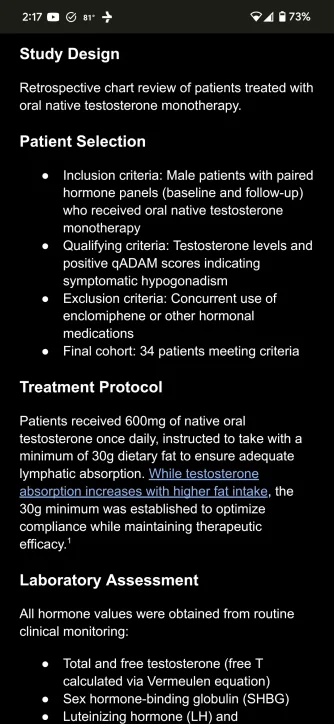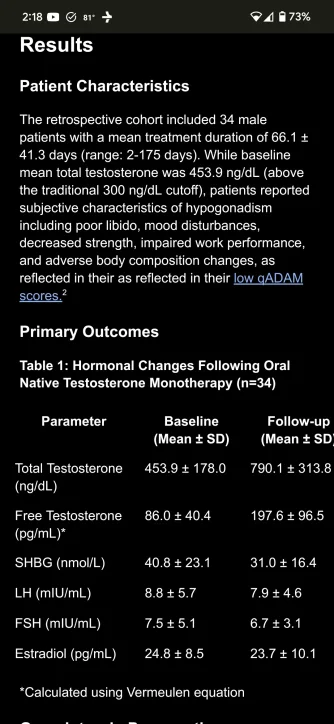Advice on next steps — mid-low free T? I'm a doctor who does a fair amount of hypogonadism management but looking for some insight given my age and circumstances of normal TT but low normal Free T.
Body:
Age 30, 6’3”, 196 lbs, ~14% body fat by BIA. Train 4–5x/wk (resistance + cardio), Mediterranean-style diet, low alcohol (1–2 drinks/week), no processed foods, ~2600-2800 kcal/day, 160-180 g protein. Supplements: creatine, beta-alanine, omega-3s, MV.
Symptoms: mild fatigue, irritability/mild anhedonia, low libido, reduced orgasm intensity, slower recovery after training. No ED, notable joint pain.
Labs:
Leaning toward trying enclomiphene or hCG monotherapy first before considering Kyzatrex or TRT. → Goal is to improve free T and DHEA-S. Already have 4 kids so not an issue of infertility.
Would appreciate input —
Thanks in advance for any advice — looking to optimize long term not just quick fix.
Body:
Age 30, 6’3”, 196 lbs, ~14% body fat by BIA. Train 4–5x/wk (resistance + cardio), Mediterranean-style diet, low alcohol (1–2 drinks/week), no processed foods, ~2600-2800 kcal/day, 160-180 g protein. Supplements: creatine, beta-alanine, omega-3s, MV.
Symptoms: mild fatigue, irritability/mild anhedonia, low libido, reduced orgasm intensity, slower recovery after training. No ED, notable joint pain.
Labs:
- Total T: 614 ng/dL
- Free T: 10.4 ng/dL (20-25th percentile for age)
- SHBG: 47
- DHEA-S: 83.4 ug/dL
- Estradiol: 37.9 pg/mL
- TSH 2.6
- CRP: 0.7
- A1c: 5.4
- Insulin: 2.6
Leaning toward trying enclomiphene or hCG monotherapy first before considering Kyzatrex or TRT. → Goal is to improve free T and DHEA-S. Already have 4 kids so not an issue of infertility.
Would appreciate input —
- Would you even consider increasing T levels?
- What protocols/doses are guys having success with in similar situation?
- Enclo vs hCG first?
- Thoughts on going straight to something like Kyzatrex
Thanks in advance for any advice — looking to optimize long term not just quick fix.













